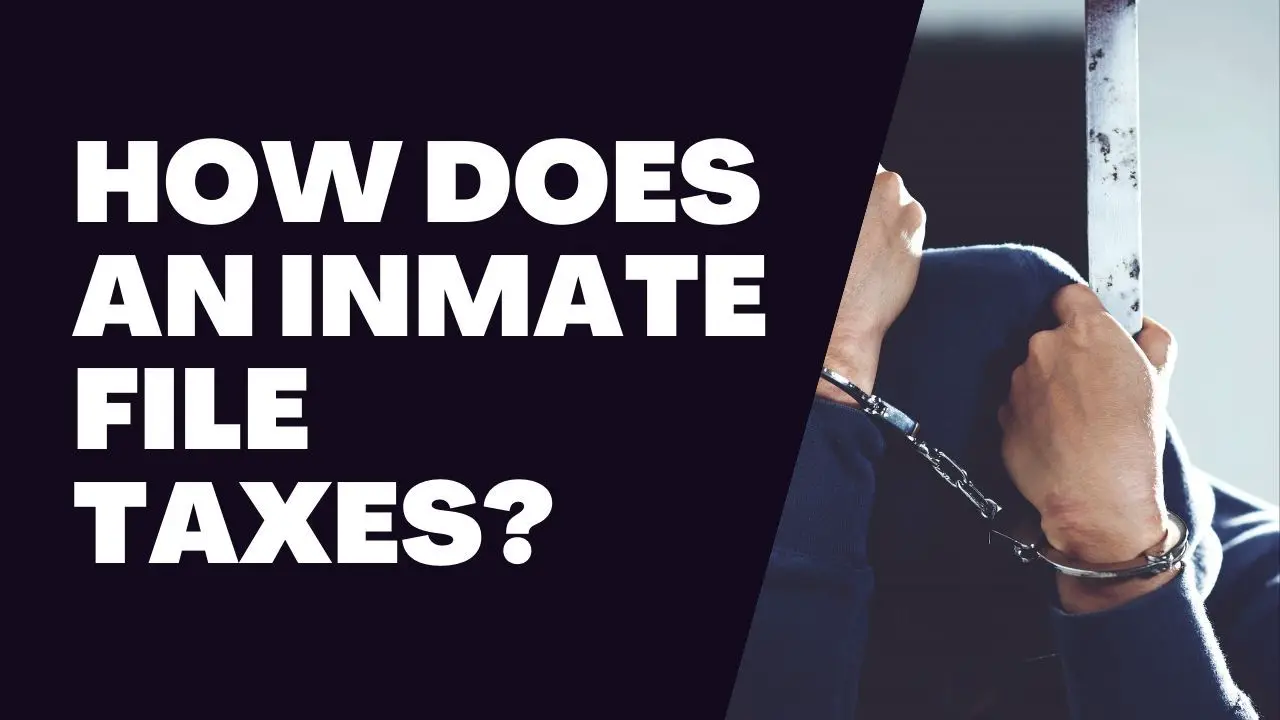How Does an Inmate File Taxes?
In this article, we will delve into the intricacies of how inmates file taxes, the specific tax filing requirements they must adhere to, etc.

Navigating the tax season becomes a topic of discussion for all U.S. citizens aged 18 and above, including prison inmates. With a staggering 2.3 million incarcerated individuals in the United States, many inmates find themselves obliged to file their tax returns.
However, filing taxes while in prison is far from a straightforward process and presents numerous challenges that demand considerable effort from the inmates and the prison staff.
Throughout this blog post, we will delve into the intricacies of how inmates file taxes, the specific tax filing requirements they must adhere to, and the unique obstacles they encounter during this undertaking.
Read How Are Cells Assigned in Prison to Inmates?
How Does an Inmate File Taxes?
The same rules apply to filing taxes in prison or behind bars. Despite their confinement, inmates are subject to the same tax filing regulations as individuals outside.
However, given the often limited income of many inmates, they may not meet the income threshold that necessitates tax filing. Different gross income criteria apply depending on the filing status—single, married filing jointly, married filing separately, head of household, or qualified widow(er) with a dependent child.
Understanding these threshold amounts is crucial for inmates to determine whether they must file taxes or not.
Why Are Inmate Contributions Not Tax-Deductible? Clarifying Tax Rules
The rationale behind this restriction is to ensure that valid charitable deductions are channeled toward organizations that offer essential services to the community and those in need.
Charitable deductions help various causes, including disaster assistance, poverty reduction, healthcare, and education.
While this may be disheartening for those wishing to assist their incarcerated loved ones through financial contributions, it's crucial to be well-informed about the tax regulations related to charitable deductions.
Instead of qualifying for tax deductions, these contributions are considered personal gifts or financial assistance, entailing no tax benefits for the giver.
Understanding the distinction between charitable donations and personal contributions is paramount to avoid inadvertent tax errors. If you have any questions or concerns regarding making financial contributions to incarcerated individuals, seeking advice from a tax professional or consulting the IRS can help ensure compliance with tax laws.
Furthermore, it's essential to be aware that alternative ways of supporting incarcerated individuals may carry tax implications for the giver. For instance, contributing to their prison commissary accounts or providing financial assistance to cover legal expenses could potentially result in tax consequences, necessitating a thorough understanding of these implications before proceeding.
Access to Tax Forms in Prisons
During the tax season, incarcerated individuals who lack assistance from family or friends can still access basic federal and state tax forms in most prisons. These forms are made available to inmates to ensure they have the necessary paperwork for tax filing.
Additionally, some prisons may offer access to volunteer tax programs that provide further support and guidance for tax preparation. However, it's important to note that inmates typically do not have access to the internet, so online tax filing options are not available to them.
To address this limitation, prisons may adopt alternative methods, such as allowing visitors to bring legal forms for signatures during a visit or involving the inmate's caseworker to assist with the process.
Appointing a Power of Attorney for Tax Matters
When incarcerated individuals encounter difficulties fulfilling their tax obligations, such as completing tax returns online or providing essential information to a tax preparer, they can designate a dependable individual with power of attorney for tax matters.
This decision grants the appointed person the authority to act on behalf of the inmate when dealing with the IRS and handling all tax-related affairs.
To initiate this process, the inmate must formally submit IRS Form 2848, which is an official authorization for the designated representative to represent them in all tax-related matters. By taking this route, incarcerated individuals can seek invaluable support in navigating the intricacies of tax laws and ensuring that their tax filing is carried out accurately and promptly.
This approach proves especially beneficial for those who may require additional assistance while incarcerated, guaranteeing that their tax affairs are handled with utmost care and diligence.
Understanding the Restrictions on the Earned Income Tax Credit for Prisoners
Prisoners are subject to particular restrictions when it comes to tax benefits like the Earned Income Tax Credit (EITC) and Child Tax Credit (CTC). The earnings they receive while behind bars do not fall under the "earned income" category, making them ineligible to claim these valuable tax credits.
As a result, inmates cannot take advantage of the EITC or CTC based on their wages earned during their time in prison.
Even if an inmate is involved in a work-release program or resides in a halfway house, any wages earned through these arrangements also do not qualify for the EITC and CTC.
The Internal Revenue Service (IRS) considers these earnings obtained while the individual is still in custody or under supervised release, excluding them from eligibility for these tax credits.
This exclusion of tax credits can significantly impact an inmate's overall tax liability. The EITC is specifically designed to provide financial support to low to moderate-income individuals and families, potentially resulting in a refund even if the individual owes no taxes.
Inmates and their loved ones must understand these limitations when it comes to tax credits. While the EITC and CTC can provide substantial financial assistance for many working individuals and families, incarcerated individuals cannot access these benefits based on their prison earnings.
As with any tax-related matter, seeking professional guidance and staying informed about IRS regulations can help inmates navigate their tax obligations correctly.
Understanding the implications of these tax credit limitations can empower inmates to make informed financial decisions during and after their time in prison.
Read Can You Visit Mountjoy Prison?
Consult a Tax Professional
Given the intricacies of tax filing for inmates, seeking professional guidance is highly recommended. As non-CPAs and non-attorneys, we cannot provide specific tax advice, but tax professionals possess the expertise needed to navigate the complexities of filing taxes while incarcerated.
Tax professionals can help inmates understand their unique tax situation, determine whether they are required to file a tax return, and guide them through the necessary steps. They can also assist in identifying potential deductions or credits that may apply to the inmate's specific circumstances, helping to optimize their tax position.
Moreover, tax professionals are well-versed in IRS regulations and updates, ensuring inmates comply with tax laws and avoid legal repercussions. Since access to tax forms, envelopes, and stamps may be limited within a prison, a tax professional can facilitate the entire process, making it easier for inmates to fulfill their tax obligations.
Additionally, tax professionals can aid inmates in understanding any special circumstances they may face, such as filing joint returns with a spouse who is not incarcerated.
With their expert advice, inmates can be confident that they are taking the right steps to meet their tax responsibilities while incarcerated.
Inmates and Taxes Our Conclusion
Filing taxes while incarcerated presents unique challenges for inmates, requiring them to navigate complex tax laws and gather necessary documents with limited resources and access to assistance.
By understanding tax filing requirements, seeking professional assistance when needed, and staying informed about tax obligations, incarcerated individuals can fulfill their tax responsibilities despite obstacles.
Although the process may be daunting, complying with tax laws ensures that inmates continue to uphold their civic responsibilities during their time behind bars.
